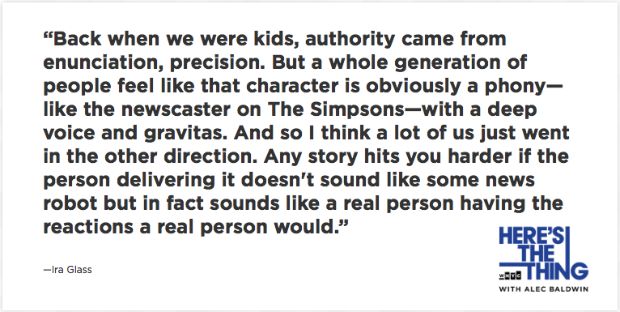It’s not much of a secret that public radio is white — really white. The lack of diversity has hardly gone unnoticed locally or nationally.
The origins go far deeper than race. Back when I was a young college student, my Boston accent was (mostly) beaten out of me in a voice and articulation class. If you wanted to go into the radio business, you had to sound like a Midwesterner, which at the time was considered the ideal American voice.
At the same time, people changed their names to hide their ethnicity. If you heard someone on the radio with two first names — Roger Allen, Gary Roberts etc. — you were listening to someone with something to hide.
We don’t do that as much now, but the industry still functions on the sound of whiteness.
This week, NPR itself pushed the issue front and center on its airwaves with this new twist: that it’s not enough to be a person of color on the radio if you don’t sound or write like a person of color.
“Public radio wants me to be black, but not too black,” Tavis Smiley once said.
Chenjerai Kumanyika, a radio producer/reporter, got the conversation started this week with a manifesto that has sparked a long-overdue conversation in the industry.
Writing on Transom.org, he said he was confronted with what a public radio voice should sound like.
Before I started writing this piece, this problem seemed simpler to me than it does now. That is because I was focusing on what I heard, and what I heard was the voices of white people on most popular and public radio shows and podcasts.
I didn’t want to hear it, but it would jump out at me despite my efforts to ignore it. Often, (not always) when I hear non-white journalists they also seem to be adjusting their vocal style of narration and reporting to what has come to be understood as professional.
However, as I dug deeper into this problem, I realized how tied up this phenomenon is with the broader complexities of speech, region, identity and dominant culture. Certainly, there are real problems with diversity that many organizations are working to address, but these problems don’t only have to do with race.
In fact, as I look across the landscape of popular podcasts, problems of representation regarding gender, ableism, sexual orientation, age and other parameters of ethnicity might be even worse. I’m focusing on the racial aspects of this problem because this is how I personally experience the imbalance.
I’m not saying that voices and styles of speech map on to the ethnicity of the speaker in any simple way. There is no single “authentic” African-American, Latino, Asian, Native American, or white way of speaking. To say otherwise would be to participate in a reductive and inaccurate essentialism of which I want no part.
So last evening, NPR’s All Things Considered put Kumanyika on the air.
Then last evening, NPR’s Audie Cornish hosted a “tweetup” featuring people of color working in the public radio system. Their stories — those limited by the 140-character limit — are worth considering.
#pubradiovoice what goes for black voices also goes for other accents (ie southern accents). I find i speak diff depending on the audience.
— Katie Smith (@katielizsmith) January 29, 2015
.@mictoground I wonder though, is special attention to whiteness of service? To Whom?
— A.C. Valdez (@ACVTweets) January 29, 2015
Back in the day it was, "How come you don't have an accent?" @GeeDee215 @catchatweetdown @nprAudie @Maxiewcpn @CelesteHeadlee
— Doug Mitchell (@nextgenradio) January 29, 2015
I listen to KQED and didn't realize @jejohnson322 was Black until I saw a picture of him on the website #PubRadioVoice
— P. Mimi Poinsett MD (@yayayarndiva) January 29, 2015
#pubradiovoice What concerned me also was so many who said they didn't hear their real voices and so turned away from public media.
— Maria Hinojosa (@Maria_Hinojosa) January 29, 2015
It's dangerous to have an "NPR type of voice" because that forces reporters to sound a like-white- #PubRadioVoice
— Maria Ines Zamudio (@mizamudio) January 29, 2015
I also know that when ppl have thought about getting mad at my race stories, lots of them see my twitter avatar and shut up #pubradiovoice
— Sam Sanders (@samsanders) January 29, 2015
Less to literal voice, I've been told in pitch mtgs (not at current job) that my Latino experience is less authentic. #pubradiovoice
— A.C. Valdez (@ACVTweets) January 29, 2015
Anyway, @democracynow sent an email explaining they needed a voice-over—they asked for a "Latino sounding" person to do it. #PubRadioVoice
— Aura Bogado (@aurabogado) January 29, 2015
Which is silly when you consider the number of ways there are to be Latino: as many as there are Latinos. #pubradiovoice.
— A.C. Valdez (@ACVTweets) January 29, 2015
I think that if public radio is serious about "sounding like America," they certainly haven't shown it. #pubradiovoice
— Jesse Thorn (@JesseThorn) January 29, 2015
Part of the problem in showcasing distinct voices is programmers suggesting our "curious audience" isn't "that curious" #PubRadioVoice
— Maxie C Jackson III (@Maxiewcpn) January 29, 2015
My favorite, the backhanded compliment — "You sound more American on the radio." #pubradiovoice
— Asma Khalid (@asmamk) January 29, 2015
I'll go deeper. The fact that I sounded "white" was a problem for blacks in my hometown. A REAL problem #pubradiovoice
— Doug Mitchell (@nextgenradio) January 29, 2015
Like in music, you don't sing opera the same way you sing gospel. The style should fit the genre. #PubRadioVoice
— Celeste Headlee (@CelesteHeadlee) January 29, 2015
So why not just let your natural voice flow? Because on radio, the number one complaint of listeners is often someone’s voice.
Ironically, perhaps, the issue was framed perfectly by the man too many public radio people try to imitate — Ira Glass.
Related: Does public radio sound too ‘white’? NPR itself tries to find the answer (Washington Post).

